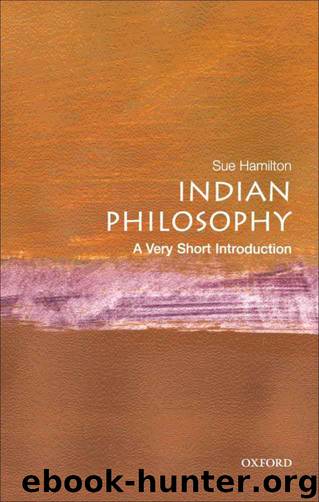Indian Philosophy: A Very Short Introduction (Very Short Introductions) by Hamilton Sue

Author:Hamilton, Sue [Hamilton, Sue]
Language: eng
Format: mobi
Publisher: Oxford University Press
Published: 2001-02-21T16:00:00+00:00
The importance of qualities is that they characterize substance in such a way as to render substance identifiable to us as this or that object. Without qualities, substance would not be distinguishable in terms of the world as we know it. Thus substance always has at least one quality inhering in it. And this inherence is itself a further category in the Vaiśeṣika schema, acting as what one might call a kind of ‘glue’ between two other categories, which otherwise could not exist on their own. An example often given to illustrate this point is the impossibility of the quality ‘colour’ occurring on its own, or the composite substance ‘rose’ occurring without the quality colour. Thus if we take in this case a red rose, the colour red necessarily inheres as a quality in the substance rose. In spite of the necessity of the relationship, however, quality (in this case colour) and substance (in this case rose), as well as inherence, are categorially separate aspects of reality. The colour red can also be used to illustrate the categories of universality and particularity. The red inhering in an individual red rose is a particular example of the universal ‘redness’. A universal may be common to any number of particulars, and it is the particularity of the individual occurrence of the universal that differentiates one rose, say, from another. Moreover, it is only by means of particularity that universality can manifest. Even individual ontologically identical atoms, ranging from all earth atoms to all self atoms, are differentiated by particularity in this radically pluralistic schema: in spite of being categorially alike, and sharing in common universality, each is in some sense unique, and this is separately categorized as its particularity. The importance of universality is that without it, there would be no way of knowing that certain particulars – say, all roses – share in a common rose-ness: that, while each is particular, they all are in fact roses.
Download
This site does not store any files on its server. We only index and link to content provided by other sites. Please contact the content providers to delete copyright contents if any and email us, we'll remove relevant links or contents immediately.
| Anthropology | Archaeology |
| Philosophy | Politics & Government |
| Social Sciences | Sociology |
| Women's Studies |
The remains of the day by Kazuo Ishiguro(9000)
Tools of Titans by Timothy Ferriss(8396)
Giovanni's Room by James Baldwin(7347)
The Black Swan by Nassim Nicholas Taleb(7130)
Inner Engineering: A Yogi's Guide to Joy by Sadhguru(6796)
The Way of Zen by Alan W. Watts(6614)
The Power of Now: A Guide to Spiritual Enlightenment by Eckhart Tolle(5784)
Asking the Right Questions: A Guide to Critical Thinking by M. Neil Browne & Stuart M. Keeley(5775)
The Six Wives Of Henry VIII (WOMEN IN HISTORY) by Fraser Antonia(5515)
Astrophysics for People in a Hurry by Neil DeGrasse Tyson(5190)
Housekeeping by Marilynne Robinson(4449)
12 Rules for Life by Jordan B. Peterson(4305)
Ikigai by Héctor García & Francesc Miralles(4275)
Double Down (Diary of a Wimpy Kid Book 11) by Jeff Kinney(4273)
The Ethical Slut by Janet W. Hardy(4256)
Skin in the Game by Nassim Nicholas Taleb(4250)
The Art of Happiness by The Dalai Lama(4130)
Skin in the Game: Hidden Asymmetries in Daily Life by Nassim Nicholas Taleb(4007)
Walking by Henry David Thoreau(3963)
